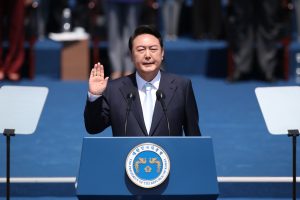The Corruption Investigation Office for High-ranking Officials (CIO) failed to detain South Korean President Yoon Suk-yeol on January 3, three days after the court issued an arrest warrant for Yoon.
The presidential security service blocked the CIO’s execution of the arrest warrant. The CIO withdrew investigators and police officers roughly five hours and a half after they had passed the main gate of the presidential residence around 8:04 a.m. KST. It informed reporters that it decided to suspend the execution of the arrest warrant at 1:30 p.m. due to concerns for the safety of the dispatched investigators and police officers caused by the confrontation of presidential security service and military officers on site.
According to local media reports, more than 200 security service and military officers layered, with arms entwined, to block the CIO investigators and police officers’ attempt to arrest Yoon at the presidential residence. The CIO reportedly dispatched 20 investigators and 80 police officers but it was not enough to detain Yoon. There were also more than 10 buses and military vehicles to impede the execution of the arrest warrant, which had been issued by a court in accordance with the law.
In order to arrest Yoon, the CIO needed to meet him directly to show the arrest warrant. It failed to do so as the presidential security service and military impeded the execution of the warrant in stages from the main gate of the presidential residence to the building where Yoon lives in.
As the arrest warrant clearly specifies that no military nor security reason can block its execution, the Joint Investigation Unit said it will pursue charges of obstruction of justice against the head of the presidential security. The presidential security service, however, claimed that the CIO’s investigators and the police officers trespassed on the presidential residence with no legal basis, according to local media reports.
Expressing deepest regret over the turn of events, the CIO said it will examine what measures should be taken in the wake of its failure to detain Yoon, who is begin investigated for treason after masterminding martial law on December 3. As the arrest warrant is valid until January 6, it may make a second attempt to arrest Yoon in the next three days. However, it is questionable whether the CIO can physically detain Yoon in light of the security service’s uncooperative stance.
Yoon also has his supporters among the public. “The arrest warrant is illegitimate. Yoon should not be arrested,” Yoon Hong-sik, 69, who was rallying with pro-Yoon supporters near the presidential residence on January 2, told The Diplomat. “Yoon is innocent. How can declaring martial law be treason when he is the sitting president?”
Kwon Young-se, the chairman of the ruling People Power Party’s Emergency Response Committee, condemned the CIO’s execution of the arrest warrant, calling it “an act of exceeding its authority.”
Park Chan-dae, the floor leader of the main opposition Democratic Party, said the CIO should try again to arrest Yoon as the suspected ringleader of a treason plot. He also said that arresting the president is “the most urgent task” to overcome the country’s crisis.
According to a poll reported by MBC, 69 percent of respondents said the Constitutional Court should uphold the impeachment of Yoon while 26 percent opposed it. Yoon’s approval rating also plummeted to 11 percent in the wake of his illegitimate declaration of martial law, demonstrating the majority of the public’s anger toward him.































